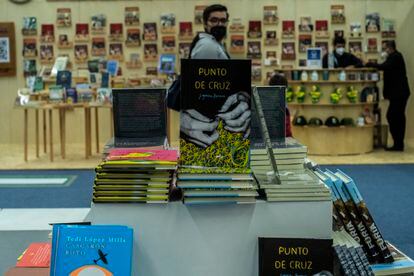The Guadalajara International Book Fair, in 2021. Hector Guerrero
For decades the independent character of Mexican culture has been an artifice, the edition included.
A consequence that surprises no one.
And that, if we extended it to the syllogism, it would be sustained by the obvious premise: most publishers or labels that do not belong to transnational conglomerates, or not yet, depend on financing from the State, embassies, universities or institutes to cover part of the costs of production.
The procedure —if it is dissociated from the ruse and understood as the power to create— is not deceitful, but rather alert and imperative, since it responds to mere survival.
Like the bull in the middle of a fight, small and medium-sized publishers, by natural disposition or acquired experience, move from right to left, from back to front,
in the international market place with caution, with strategy, at the same time as with recklessness.
Publishing independently in this country is therefore a heroic action.
The supply of cultural goods and services in Mexico is one of the largest in the world.
Equally so is the potential demand with the 121 million Spanish speakers and its geographical position that makes it an enclave between South America, the Caribbean and the United States and Canada.
How
Mexico describes: reality and opportunities for the publishing and book sector in Spanish
, published by the Cultural Center of Spain, our country is the main exporter of Spanish publishing houses in Latin America.
In addition, the public administration, on the one hand, with Conaliteg in charge of editing, producing, distributing and purchasing 195 million textbooks a year for preschool, primary and telesecundaria programs and, on the other, with the Fund of Economic Culture and the newly adhered, under the expansive cultural policy of Taibo II, Educal and DGP, has a colossal and even invasive role.
Both sectors, the private transatlantic one and the State one, flood the market and, paradoxically, in this plethora, the so-called “independents” barely have a place.
Although, either due to lack of interest in fattening the sector or due to the lukewarm attacks of public policies and their officials who are like abantos, without poise, the book market has already suffered more banderillazos than any brave bull can bear As of 2010, the number of independent publishers in the country increased, as stated in the Study of the publishing sector in Mexico of July 2020, prepared by the Chilean Commercial Office in Guadalajara.
And, bravely, to add to the aptly named bibliodiversity —a term coined by the group Editoriales Independientes de Chile at the end of the 1990s— saw the birth of new stamps and catalogs, beyond the already conspicuous triad Era, Sexto Piso and Almadía, for mention just a few: Antelope, Canta Mares, Quadrivio, Hermit Editions, Elephanta, Grain of Salt,
With a badly wounded sector, barely existing reading practices —an adult barely reads two books a year— and the scarcity of bookstores in the most remote and disadvantaged areas —the average is one point of sale for every 45,000 people—, independent Mexican publishers , which make up 80% of the market, can in no way depend only on their sales.
Even more so if its production is compared to a transnational that publishes about 1,500 books a year, while a small one between 10 and 30 titles is successful.
With this scenario, dependency to safeguard independence is essential, however contradictory it may seem.
Unfortunately, at the State level, the support and stimulus programs, in favor of the implemented austerity policy, are increasingly reduced.
The Fonca,
At the risk of disappearing by presidential decree with the extinction of public trusts, it survived, but joined the Ministry of Culture in 2020. An adhesion that tied its Promotion program to cultural projects and co-investments to the budget and interests of the Ministry itself .
Similarly, the Reading Promotion Strategy, which far from creating readers is based on free and fuels unfair competition between the State and independents, has proven to be unsuccessful.
Thus, the artifice of publishing house independence will always require skill: keeping the creative voice outside of mercantile and ideological mandates, despite the need for financing.
Like a fighting animal that is contained in a ring, it will never be tamed or subdued again.
Perhaps due to this iron rebellion, deep down there is, as José María Epinasa, founder of the now defunct Ediciones Sin Nombre, stated, “a political need for the independent book to disappear”, to send it to the slaughterhouse.
They forget, however, that rather than spare their lives, independent publishers are brave bulls that should be paid tribute to.
Adriana Romero-Nieto
is a storyteller, columnist, literary translator from French and English into Spanish, and partner editor of AUIEO editions.
subscribe here
to the
newsletter
of EL PAÍS México and receive all the informative keys of the current affairs of this country
Exclusive content for subscribers
read without limits
subscribe
I'm already a subscriber

